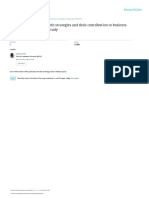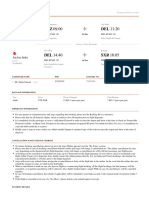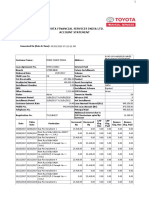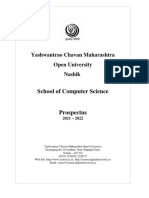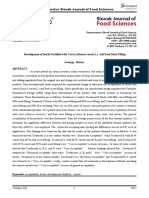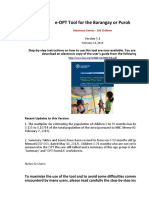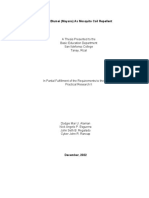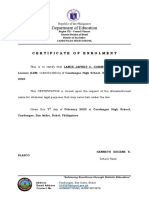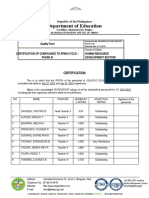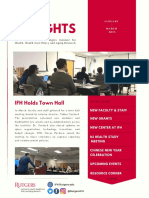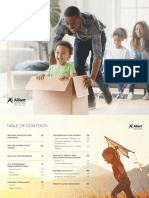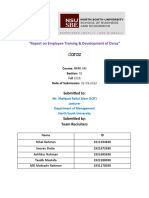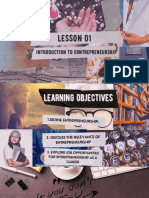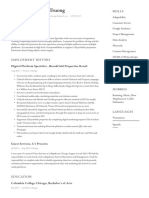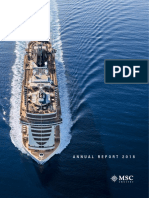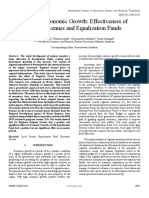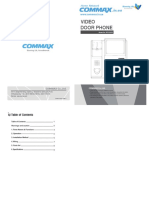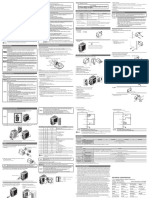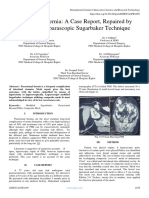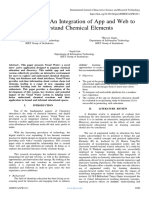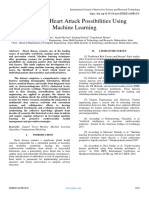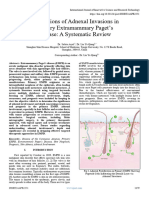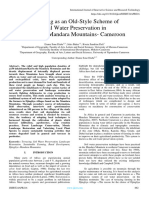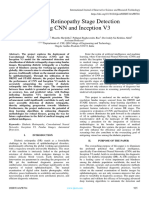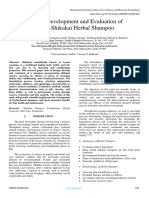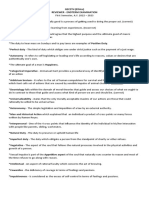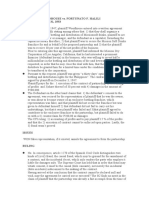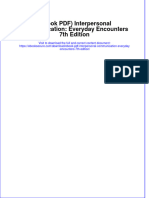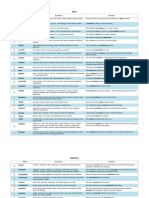Professional Documents
Culture Documents
Professional Ethics, Organizational Practices, and Culture of Trust by Entrepreneurial Managers of Selected Small and Medium Enterprises in Bulacan
Original Title
Copyright
Available Formats
Share this document
Did you find this document useful?
Is this content inappropriate?
Report this DocumentCopyright:
Available Formats
Professional Ethics, Organizational Practices, and Culture of Trust by Entrepreneurial Managers of Selected Small and Medium Enterprises in Bulacan
Copyright:
Available Formats
Volume 8, Issue 2, February – 2023 International Journal of Innovative Science and Research Technology
ISSN No:-2456-2165
Professional Ethics, Organizational Practices, and
Culture of Trust by Entrepreneurial Managers of
Selected Small and Medium Enterprises in Bulacan
Project Leader: Araceli M. Reclusado, PhD
Collaborator: Allan B. Pleno, MBA
College of Business Administration
Bulacan State University – Bustos Campus
Abstract:- This paper emphasizes some ethical ways of https://www.iaa.govt.nz/for-advisers/adviser-tools/ethics-
being a leader and steers for own professional toolkit/professional-ethics-and-codes-of-conduct)
development and growth as entrepreneurial managers.
We have witnessed that some organizations have become The interest on professional ethics by entrepreneurial
more diverse in terms of ethical values and those in the managers fostering cultures of trust are considered starting
business arena are experiencing ethical dilemmas that if points for writing this study. As educators, our personal and
not given immediate attention may result to serious professional experiences led the researchers to investigate
complications. Thus, this study likewise emphasizes the and study the perspectives and reflections that provided by
necessity to explore ways in which the sample of entrepreneurial managers of selected Small and Medium
entrepreneurial managers find their values and Enterprises (SMEs) in Bulacan regarding their own ethical
behaviors as contributing to the fostering of culture of behaviors, characteristics, and values.
trust within the organization. This research employed a
quantitative-qualitative methods of research. A Entrepreneurial Managers, whether business owners,
quantitative-descriptive design is used to observe and managers, supervisors, persons-in charge of the business,
measure the variables to identify the different categories function, and work as to improve the business operations.
of small and medium enterprises in selected He/she is the one who takes care of managing and allocating
municipalities in Bulacan. A qualitative-narrative the resources, leading and supervising employees to ensure
design is used to conduct an in-depth interview to productivity and efficiency of operations; thus, providing
reconcile conflicting stories and highlight tensions and directions on how best to handle different tasks while
challenges which can be opportunities for innovation. A maintaining customer satisfaction. They implement
narrative survey design, based on the study by Gardiner strategies that will help generate more revenue or
and Tenuto (2015), was utilized consisting of a semi- profitability for the business. They hire and manage
structured oral interview process with the key employees or workers, prepare budgets, work on team
informants from small and medium enterprises in building efforts or restructure the organization to affect
selected municipalities in Bulacan. Data were collected in necessary change. Therefore, there is a need to determine
the form of interviews and professional observations the ethical ways of being and the leading for professional
with the entrepreneurial managers, such as business growth and growth as entrepreneurial managers.
owners, managers, supervisors, and officers-in-charge.
Dilemmas reported were analyzed utilizing respondents’ Literature Review
ethical values in an organization together with the Brown and Trevino (2006) defined ethical leadership
ethical leadership theories. Results indicated ways how as “the demonstration of normatively appropriate conduct
business or organizational leaders can utilize ethical through personal actions and interpersonal relationships, and
decision-making for organizational improvement and the promotion of such conduct to followers through two-
ways to build a culture of trust within the organization. way communication, reinforcement, and decision-making.”
Examples of such conduct include openness, honesty, and
Keywords:- Professional Ethics; Organizational Practices; treating employees fairly and thoughtfully. Social learning
Culture of Trust; Entrepreneurial Managers; Small and theory was used to gain an understanding as to why ethical
Medium Enterprises. leadership is important to employees and how it is perceived
to work.
I. INTRODUCTION
Kaptein, M. (2017) defined an ethical leader as “the
Professional ethics are principles that govern the one who is not only a moral person and a moral manager
behavior of a person or group in a business environment. who demonstrates what is normatively appropriate behavior
Like values, professional ethics provide rules on how a and follows the current ethical norms. An ethical leader is
person should act towards other people and institutions in also a moral entrepreneur who creates new ethical norms.”
such an environment. (Retrieved from He argued that there is a third component to ethical
IJISRT23FEB1048 www.ijisrt.com 1859
Volume 8, Issue 2, February – 2023 International Journal of Innovative Science and Research Technology
ISSN No:-2456-2165
leadership—moral entrepreneurship, in addition to the According to a business dictionary an “entrepreneur”
already defined components of the moral person and the is a person who is trained to take initiative by organizing a
moral manager. His belief is that moral entrepreneurship business to take benefit of a specific opportunity when he
opens avenues for studying various antecedents and comes across it and decides what, how, and how much of a
outcomes of ethical leadership that hasn’t been good or service will be produced. An takes the risks who
acknowledged adequately to date. will do anything to win. He will always keep an eye on what
is happening under his supervision by monitoring and
Studies of the antecedents of ethical leadership, at both controlling all the business activities. But according to
the situational and personal levels, have found that leaders economist Joseph Alois Schumpeter, entrepreneurs are not
who have had ethical role models are more likely to become entirely motivated by profit but they regard their as a
ethical leaders. These studies have also found that the standard for measuring achievement or success being their
personality traits of agreeableness and conscientiousness are way to prove the society in which they live in that can do a
positively related to ethical leadership. And studies on “thing” better than anyone else.
corporate social responsibility are concerned with how
companies can contribute to societal development, not only Entrepreneur managers can create and control change
in the sense of solving social problems, but also in the sense within the organization. This means they are responsible in
of improving social welfare, promoting social progress, and solving problems, generating new ideas, and implementing
creating new social value. them. It also involves allocating funds, as well as assigning
staff and other organizational resources. Entrepreneurial
Philippine Business (2019) revealed that more leadership involves organizing and motivating a group of
Filipinos today are starting their own businesses. These new people to achieve a common objective through innovation,
entrepreneurs come from diverse backgrounds and a wide risk optimization, taking advantage of opportunities, and
range of ages – from college students to retirees, and managing the dynamic organizational environment. The
everyone in between. No matter their background or the traditional corporate mindset has its focus on systems and
kind of business they put up, new entrepreneurs are likely to processes, whereas the entrepreneurial style is more risk
face similar challenges such as lack of funding, cash flow oriented.
concerns, and lack of management skills. Thus, to start
your own venture, you need to be prepared for these Indeed Career Guide (2021) stated that “Ethical leadership
challenges and create a plan to address them. demonstrates a high regard for values”. The principles of ethical
leadership include honesty, justice, respect, community and
The dictionary defines ethical issues as “the study of integrity-- it is critical to the success of any business. Ethical
standards of conduct and moral judgment; moral leaders should demonstrate ethical and appropriate behavior in
philosophy, a treatise on this study or the system or code of every facet of their life over time, even when their behavior is not
morals of a particular person, religion, group or profession.” necessarily observable by their employees. Ethical leadership may
even occasionally be unpleasant, for example when it involves
Ethical issues in business is a situation where a moral terminating an employee who uses company property for personal
conflict arises and must be addressed. In other words, it is an ends. Nevertheless, maintaining your integrity is of paramount
occasion where a moral standard is questioned. Ethical importance to leadership. Ethical leaders also work to create an
issues occur when a given decision, scenario or activity ethical work culture. This means that a work environment is
creates a conflict with a society’s moral principles. Both governed by a fair, clearly articulated set of rules, rather than by
individuals and businesses can be involved in these conflicts personality or politics. In an ethical work culture, an
since any of their activities might be put to question from an organization’s management articulates a set of principles that are
ethical standpoint. Individuals are subject to these issues in understood, and bought in to, by everyone in the organization.
their relationships with other individuals or in their
relationships with organizations and same goes for
organizations.(Retrievedfromhttps://www.myaccountingcour
se.com/accountingdictionary/ethical).
IJISRT23FEB1048 www.ijisrt.com 1860
Volume 8, Issue 2, February – 2023 International Journal of Innovative Science and Research Technology
ISSN No:-2456-2165
Conceptual Framework of the Study
Fig 1 Professional Ethics, Organizational Practices, and Culture of Trust by Entrepreneurial Managers of Selected Small and
Medium Enterprises in Bulacan
Figure 1 presents the Independent Variables (IV) which consist of professional ethics and organizational practices by
entrepreneurial managers. The Dependent Variables (DV) which consist of culture of trust in an organization leading to success.
Objectives of the Study
The primary goals of the study are to identify some ethical ways of being and leading for own professional development and
growth as entrepreneurial managers. The secondary goal of the study is to explore ways in which the sample of entrepreneurial
managers find their behaviors as contributing to the fostering of culture of trust.
II. METHODOLOGY OF THE STUDY
Subject
This study involved the 29 participants from selected small and medium enterprises in Bulacan: Baliuag, Malolos, Marilao,
Meycauayan, and San Jose Del Monte. Respondents are business owners, managers, supervisors, and officers-in-charge of the
participating businesses. It allowed the researchers to draw more precise conclusions by ensuring that participants are from small
and medium enterprises and properly represented by selected municipalities in Bulacan.
Table 1 Frequency and Percentage Distribution of the Respondents’ Profile
Profile of the Respondents in terms of Small and Medium Enterprise
MUNICIPALITY SME’s CATEGORY FREQUENCY PERCENT
Small Medium
Baliwag 5 1 6 20.69
Malolos 4 1 5 17.24
Marilao 4 2 6 20.69
Meycauayan 5 0 5 17.24
San Jose Del Monte 5 2 7 24.14
TOTAL 23 6 29 100%
SMEs – Small and Medium Enterprises
Table 1 shows that the participating businesses were monitored and checked if all questions were answered
dominated by Small Enterprises with 23 respondents and religiously by the participating respondents.
Medium Enterprises were 6 respondents respectively. San
Jose Del Monte City has the highest frequency of 7 or 24.14 Instrument
percent of respondents and the least are Malolos and This study used a quantitative-qualitative methods of
Meycauayan with 5 or 17.24 percent of respondents. There research. A quantitative-descriptive design is used to
were face-to-face interactions during the conduct of the observe and measure the variables in order to identify the
study, since the interview questionnaires were administered categories of small and medium enterprises in selected
personally by the proponents, and the responses were municipalities in Bulacan. A qualitative-narrative design is
used to conduct an in-depth interviews to reconcile
IJISRT23FEB1048 www.ijisrt.com 1861
Volume 8, Issue 2, February – 2023 International Journal of Innovative Science and Research Technology
ISSN No:-2456-2165
conflicting stories and highlight tensions and challenges You are working with an entrepreneurial manager or
which can be opportunities for innovation. The interview owner who has “power over” you and openly displays
questionnaire is based on the study by Gardiner and Tenuto racist behavior. You have tried to convey that you do
(2015). They utilized a narrative survey design consisting of not condone the behavior. The manager’s behavior is
a semi-structured oral interview process with their specifically directed at other colleagues in your
participants to elicit personal narratives, reflections, company and seems to be escalating. You are aware
perceptions, thoughts, ideas, and visions. Narrative surveys that these colleagues are afraid to complain on a more
can involve the oral speech, observations by the proponents, formal basis. What is your ethical responsibility in this
written notes, shared experience, history, and story-telling situation?
from key informants.
None. Ignore the situation as it does not directly involve
The proponents investigated the professional ethics, as you.
well as the organizational practices by selected Discuss directly with your colleague about how the
entrepreneurial managers using the assessment form adapted group of colleagues feels.
from Gardiner and Tenuto (2015), utilized constructed Discuss privately with the colleague and inform them of
questions and encouraged oral narratives from their support/complaint processes.
participants. Gardiner and Tenuto’s (2015) analysis revealed Other.
patterns and themes in their participants’ orations and
ethical dilemmas as well as decision-making processes of Data Collection Procedures
the participants. The results can identify entrepreneurial The mode of data gathering was the interview
managers’ codes of ethics, leadership dilemmas, and ethical questionnaire method administered personally by the
decision-making. proponents. In gathering the pertinent data for this study, the
proponents carried out the following procedures:
Gardiner and Tenuto (2015). Interview Questions
Include: Inquired/Asked Recommendation For The Best Key
Informants For This Study From The Business Permit
In your opinion, what are the necessary values of an Licensing Office (BPLO) Of Each Municipality;
ethical entrepreneurial managers? Sent A Request Letter To Registered Small And
Do you believe there are specific behaviors or Medium Enterprises Of Selected Municipalities To
characteristics that define an ethical leader? Conduct An Interview And Observation;
What kind of ethical challenges do you encounter as an Employed The Ethics Of Research, The Health And
entrepreneurial manager and what are some of the Safety Protocols During Interviews; And
practices that you employ to solve them? Gathered And Analyzed The Information/Data From
Can you tell me about a time when you faced an ethical The Key Informants.
dilemma in your leadership role and what worked or did
not work in solving the problem? Data Analysis
What are some of the ways that you have tried to build The data gathered in this study were carefully analyzed
a culture of trust? by the proponents to identify the patterns and themes in the
Are there any ethical leaders who have influenced or respondents’ orations , in terms of, the necessary values for
inspired you? an ethical entrepreneurial managers (managers, supervisors,
persons-in-charge of the business), characteristics,
Two case scenarios were asked from the participants challenges encountered, and their practices in solving them,
for a comprehensive analysis of the data gathered by the ethical dilemma, building culture of trust, ethical persons
proponents. who have influenced them and case scenarios. The study
also provided the implications of the findings towards the
A long-time colleague of yours has misappropriated fostering and building of cultures of trust. Each interview
substantial funds from the company’s budget for was transcribed and analyzed by the proponents to search
personal gain. You have knowledge of your colleague’s for occurring repeatedly and similar ethical aspects,
financial duress on a personal basis and are aware of considerations, and practices. Each interview was further
this behavior on your colleague’s part. How would you reviewed looking for recurring themes of ethical behaviors,
deal with this problem on a personal and/or characteristics, and values of the respondents.
professional basis?
Ethical Consideration
Anonymously contact police or tell your colleague’s In adherence and observance of ethical standards set
supervisor. for research undertaking involving the request letter to
Discuss directly with your colleague and encourage him Business Licensing Office (BPLO) for the registered Small
to admit and seek help. and Medium Enterprises (SMEs) in their municipalities; the
Stay quiet and not say anything hoping someone else Agreed Informed Consent form approved and signed by the
will find out. key informants prior to the conduct of interview; and the
Other. request letter of invitation to participating enterprises, so as
to proceed to the conduct of interview.
IJISRT23FEB1048 www.ijisrt.com 1862
Volume 8, Issue 2, February – 2023 International Journal of Innovative Science and Research Technology
ISSN No:-2456-2165
The interview survey questionnaire instrument, by their data. Hence, the confidentiality of the information
Gardiner and Tenuto (2015), does not required a letter to use supplied by the key informants was respected and the
this assessment as any researcher can use this assessment researchers will do everything in their power to protect the
tool for research purposes. Moreover, following the ethics anonymity of the participants. Further, the business name
of research, key informants’ responses were voluntarily, and the personal identity of the key informants will not be
treated confidentially, and they may withdraw their published without their consent.
responses anytime should they preferred confidentiality of
III. RESULTS AND DISCUSSIONS
According to most of the key informants who are entrepreneurial managers representing their business firms as owners/store
managers/supervisors/officers-in-charge from selected small and medium enterprises in Bulacan, they identified having respect as
the topmost, followed by having knowledge and being honest, next are being considerate and transparent, risk-taker and
approachable.
The least are identified being a law-abiding citizen, adaptable, persistent, determined, observant, concerned, consistent,
having a pleasing personality, and good in communication as values that are necessary for an ethical entrepreneurial managers
should own as shown on the figure below.
Fig 2 Necessary Values of an Ethical Entrepreneurial Managers
A. Do you Believe there are Specific Behaviors or Characteristics that Define an Ethical Leader?
The table below shows that majority of the respondents answered Yes (25 or 86.21 percent) believed that there are specific
behaviors or characteristics that define an ethical leader. These specific behaviors or characteristics are professionalism, a good
listener, with a strong influence, experience, and skills, knows how to develop people’s potentials, humble or low-profile,
accountable, a role model, strict to policies, and possess moral values.
Only one respondent answered None, believing that there are leadership virtues that are common to many that make an
almost standard definition.
Table 2 Do you Believe there are Specific Behaviors or Characteristics that Define an Ethical Entrepreneurial Manager?
YES NONE NO ANSWER TOTAL
F P F P F P F P
25 86.21 1 3.45 3 10.34 29 100
B. What Kind of Ethical Challenges do you Encounter as employees and their differences, married employees having
an Entrepreneurial Manager and what are Some of the an affair or immorality, staff moving out due to job
Practices that you Employ to Solve them? opportunities abroad, maintain customers satisfaction,
connection with the suppliers, and others; adhering to rules
Ethical Challenges Encountered by Entrepreneurial and maintaining a harmonious relationship with others; and
Managers and their Practices in Solving them adapting to changes. And the practices that these
Some of the ethical challenges encountered by the key entrepreneurial managers, such as to communicate well with
informants are challenges in the management of the the right people, influencing the workplace by advancing an
IJISRT23FEB1048 www.ijisrt.com 1863
Volume 8, Issue 2, February – 2023 International Journal of Innovative Science and Research Technology
ISSN No:-2456-2165
organizational climate that expects individuals to carry out E. Are there any Ethical Leaders who have Influenced or
their tasks with a great respect for honesty and integrity, and Inspired you?
following the rules and policies of the organizations.
Ethical Leaders who have Influenced Educational
C. Can you Tell me About a Time when you Faced an Leaders
Ethical Dilemma in your Leadership Role and what Most of the key informants answered the business
Worked or did not Work in Solving the Problem? owners where they work, followed by their families, and
customers. Others have their own inspirations, and these are
Ethical Dilemma in your Leadership Role the following:
Most of the key informants experienced confidential
dilemmas which takes time to solve. They also stated that Jesus Christ
discussing with those they trust helps as well as finding and He was a listening leader. Because he loved others
seeking facts versus opinions and hearsay. Two of the key with a perfect love, he listened without being
informants also added that choosing between following condescending. A great leader listens not only to others, but
orders that are not aligned with their perspectives, morals also to his conscience and to the promptings of God. Jesus
and beliefs is really a difficult situation and is hard to get out was a patient, pleading, loving leader.
from.
Retrieved from https://www.churchofjesuschrist.org › ensign
Misunderstanding about work inventory, division of › 1979/08
work, letting toxic clients go due to misunderstanding are
added dilemmas faced by the key informants. Another one Mahatma Gandhi
from a small enterprise gave an example that he encountered Mohandas Karamchand Gandhi is widely recognized
recently. This was regarding an employee doing unethical as one of the twentieth century's greatest political and
accounting practices, the employee explained her side but spiritual leaders. Honored in India as the father of the
admitted her mistakes too. These are an example of the nation, he pioneered and practiced the principle of
dilemma they experienced as entrepreneurial managers in Satyagraha—resistance to tyranny through mass nonviolent
which they have to bridge between the top management and civil disobedience.
the employees. Also added was that there should be a
balance between the two. Further, evaluation, open forum, Retrieved from https://www.youthforhumanrights.org ›
and proper communication are the cited solutions by most of mahatma-gandhi
the key informants to promote good relationship between
the management and the employees. Henry Sy
He was known as the "father of modern Philippine
D. What are Some of the Ways that you have Tried to Build retail". He developed ShoeMart into SM Investments, one of
a Culture of Trust? the largest malls in the Philippines. He also founded BDO
Unibank and real estate. For eleven straight years until his
Ways to Build a Culture of Trust death, Sy was named by Forbes as the richest person in the
The key informants cited a few ways on how to build a Philippines.
culture of trust within their organizations and these are the
following: Retrieved from https://simple.wikipedia.org/wiki/Henry_Sy
Proper communication, open forum, know your team, Robert Kiyosaki
remove the barriers, and keep cordial relationship He developed transformational, situational, and
despite issues within the organization. Put yourself in participatory leadership skills in managing operations at the
their shoes. Cashflow Technologies Company through life time
Implement quality and consistency in the rules and experiences.
regulations of the company.
Show that you trust your employees, respect their Retrieved from https://studycorgi.com/robert-kiyosakis-
rights, to gain their trust too. leadership-style
Express empathy, concern, and listen to the needs of
your employees. Luigi Vera Jr.
Employ transparency. The respondents stated that if you The managing director of Am-Phil Group, the
are honest to your employees, it will reciprocate back to corporate vehicle behind Chili's and other brands. Retrieved
the manager. from https://www.pressreader.com/philippines/manila-
Give constructive criticisms to improve their work and bulletin/20170322/281994672311695
skills and believe in their potentials.
Show dedication to the job, as well as to the employees. Francis Kong
Treat everyone with respect and fairness. The President of Success Options Inc. and Director of
Participative management. A type of leadership wherein Inspire Leadership Consultancy One of the most respected
employees are encouraged to give their inputs on most business speakers in the country, Francis Kong is a recipient
of the organization decisions. of the Outstanding Filipino (TOFIL) Award 2014. Francis is
IJISRT23FEB1048 www.ijisrt.com 1864
Volume 8, Issue 2, February – 2023 International Journal of Innovative Science and Research Technology
ISSN No:-2456-2165
a columnist, and his column at the Philippine Star has been Opinions on the Following Case Scenarios
awarded best business column for the years 2009, 2010, The following case scenarios were discussed with the
2013, 2014 and 2015 and has been accorded hall of fame key informants and were asked to give their opinions
awardee by the catholic mass media awards. accordingly.
Retrieved from https://inspireleaders.com.ph/resource- A long-time colleague of yours has misappropriated
person/francis-kong substantial funds from the company’s budget for
personal gain. You have knowledge of your colleague’s
BTS K-Pop Band financial duress on a personal basis and are aware of
The key informant is inspired by them for the group’s this behavior on your colleague’s part. How would you
good ethics and for being effective artists. deal with this problem on a personal and/or professional
basis?
BTS stands for Bangtan Sonyeondan. It is also known Anonymously contact police or tell your colleague’s
as the Bangtan Boys. It is a seven-member South Korean supervisor.
boy band formed in 2013 in Seoul. Bangtan Sonyeondan in Discuss directly with your colleague and encourage him
Korean means "bulletproof boy scouts." Koreans call them to admit and seek help.
by this name, however people in other countries refer to Stay quiet and not say anything hoping someone else
them as BTS. Retrieved from https://en.wikipedia .org / will find out.
wiki/BTS Other.
Fig 2 Case Scenario No. 1
Figure 2 shows that majority of the respondents have You are working with an entrepreneurial manager or
the same opinion with option B and said that they will owner who has “power over” you and openly displays
discuss it with their colleague and encourage them to admit racist behavior. You have tried to convey that you do
and seek help, with 21 or 72.41 percent of the respondents. not condone the behavior. The manager’s behavior is
The said respondents would do this in order their colleague specifically directed at other colleagues in your
to stop his or her wrong doings. They also added that they company and seems to be escalating. You are aware
will advise the person not to do it again. On the other hand, that these colleagues are afraid to complain on a more
two of the respondents or 6.90 percent said that they will formal basis. What is your ethical responsibility in this
anonymously contact police or tell your colleague’s situation?
supervisor. And 2 of the respondents said that he will
perform other methods such as telling it to the business None. Ignore the situation as it does not directly involve
owner himself and have him given a memo warning, while 4 you.
of the respondents have no answer on this case scenario. Discuss directly with your colleague about how the
group of colleagues feels.
Discuss privately with the colleague and inform them of
support/complaint processes.
Other.
IJISRT23FEB1048 www.ijisrt.com 1865
Volume 8, Issue 2, February – 2023 International Journal of Innovative Science and Research Technology
ISSN No:-2456-2165
Fig 3 Case Scenario No. 2
Figure 3 shows that most of the key informants chose option B, to discuss it directly with their colleague about how the
group must feel, with 13 or 44.83 percent. The key informants also stated that the issue should be discussed on meetings without
pointing fingers or name dropping on anyone. Followed by option C, to discuss privately with the colleague and inform them of
support/complaint processes, with 10 or 34.48 percent, option A with 2 or 6.90 percent, to do nothing and just ignore the situation
as it does not directly involve you.
IV. CONCLUSIONS also cited some of the practices that they are doing, such as,
to communicate well with the right people, influencing the
Based on the results of this study, there were 29 key workplace by advancing an organizational climate that
informants who are store owners, managers, supervisors, expects individuals to carry out their tasks with a great
and officers-in-charge of selected small and medium respect for honesty and integrity and following the rules and
enterprises from 4 municipalities in Bulacan, namely: policies of the organizations.
Baliuag, Malolos, Marilao, Meycauayan, and San Jose Del
Monte Bulacan respectively. Most of the key informants experienced confidential
dilemmas which takes time to solve. They also stated that
As to the Findings, Based on the Narrative Interviews, discussing with those they trust helps as well as finding and
are Concluded as Follows: seeking facts versus opinions and hearsay and choosing
The key informants identified having respect, between following orders that are not aligned with their
knowledge, being honest, considerate, and transparent, risk- perspectives, morals and beliefs is really a difficult situation
taker, and approachable. Others are identified being a law- and is hard to get out from.
abiding citizen, adaptable, persistent, determined, observant,
concerned, consistent, having a pleasing personality, and To build a culture of trust within their organization, the
good in communication as values that are necessary for an key informants determined proper communication, open
ethical entrepreneurial manager. forum, know your team, remove the barriers, and keep
cordial relationship despite issues within the organization.
Majority of the key informants believed that there are Also stated, implement quality and consistency in the rules
specific behaviors or characteristics that define an ethical and regulations of the company. show that you trust your
leader. These specific behaviors or characteristics are employees, respect their rights, to gain their trust too.
professionalism, a good listener, with a strong influence, express empathy, concern, and listen to the needs of your
experience, and skills, knows how to develop people’s employees, transparency, constructive criticisms, show
potentials, humble or low-profile, accountable, a role model, dedication to the job, as well as to the employees, treat
strict to policies, and possess moral values. everyone with respect and fairness, and employ a
participative management.
The key informants cited some of the ethical
challenges they encountered such as challenges in the Two case scenarios were discussed with the key
management of the employees and their differences, married informants and were asked to give their opinions
employees having an affair or immorality, staff moving out accordingly. For the case scenario 1, regarding a colleague
due to job opportunities abroad, maintain customers misappropriating substantial amount that they are aware
satisfaction, connection with the suppliers, and others; with, majority of the key informants stated that they will
adhering to rules and maintaining a harmonious relationship discuss it with their colleague and encourage them to admit
with others; and adapting to changes. The key informants and seek help. The latter will do this for their colleague to
IJISRT23FEB1048 www.ijisrt.com 1866
Volume 8, Issue 2, February – 2023 International Journal of Innovative Science and Research Technology
ISSN No:-2456-2165
stop his or her wrong doings. They also added that they will Accordingly, ethical dilemmas can be resolved
advise the person not to do it again. For the case scenario 2, through effective decision-making. An ethical dilemma
about a leader who is openly displays racist behavior requires a person to define right from wrong. In any
directed to minority group of colleagues in their company, dilemma, the following steps are recommended which a
majority of the key informants have answered that they will leader can take to resolve it. This is called the RIGHT
discuss it directly with their colleague about how the group Decision Method: (a) The first step is Recognize the ethical
must feel. One key informant further stated that the issue dilemma being faced. All dilemmas have the same form: “If
should be discussed on meetings without pointing fingers or I do A, I will get negative consequence X, If I do B, I will
name dropping on anyone. get negative consequence Y” (b) The second step is Identify
points of view in the situation. This means considering the
RECOMMENDATIONS viewpoint of the person receiving services, your colleagues,
other parties involved, etc. Restating the problem clearly to
The researchers offered the following someone else can also help a leader check out whether he
recommendations based on the findings and conclusions interpreted the situation accurately. It is important to
revealed in the study. understand how the person receiving supports feels. (c) the
third step is Gather resources and assistance. Now that a
Accordingly, ethical leadership means that leader has an accurate understanding for the problem and
individuals behave according to a set of principles and various perspectives, this step encourages him to consider
values that are recognized by the majority as a sound basis other people who may be able to assist him. A leader may
for the common good. These include integrity, respect, also need to find important information from other agencies,
trust, fairness, transparency, and honesty. An ethical legal services, and community resources. (d) the fourth step
leaders must be accountable for any actions, take charge, is Have a plan. Formulating a plan will help a leader decide
and shape the present and future through their words and the best way to put his ideas into action. Once he considered
deeds. Ethical leaders are present in good and bad times, the following issues, he has to write a plan down and
develop their teams, and defend others when needed. identify step-by-step actions that he plan to take. (e) Lastly
Hence, it is recommended to the entrepreneurial managers is to Take action based on ethical standards. The fifth and
that they may truly and deeply live out the real values of final step is implementing the plan a leader developed in the
being professional and ethical leaders. In fact, manner he decided. Then, it is important to monitor its
professionalism entails moral ascendency. success using the success indicators he identified in the
planning process to help him reflect on his decision.
They may reflect on the following: (a) Honesty is not
just about telling the truth. It is about being real with To any case scenarios especially in their respective
yourself and others about who you are, what you want and businesses, it is important that a leader may remain
what you need to live your most authentic life. Honesty transparent in everything, consistent with company policies,
promotes openness, empowers us, and enables us to develop knows a proper way of communication, living out a
consistency in how one presents the facts. (b) The key to participative management a way to build a culture of trust
leadership is to lead with love. Leading with love means within the organization. Just like some influential leaders,
knowing and caring about what inspires and empowers who possessed the unique and exceptional traits of a leader,
people. It is about caring enough to know what is important they may opt to follow the examples of these people as an
to them and helping them succeed. (c) Work-driven leaders inspiration for being professional-ethical leaders. As
can do more than define purpose at work. They can connect Mahatma Gandhi fights without the use of violence, leaders
with their team and motivate them to care about a cause, too. should do the same. As Jesus Christ altruistically loves the
Work-driven leaders care about their team as people. (d) humankind, leaders should love their work and subordinates
Being compassionate can encourage healthy relationships as by giving themselves without anything in return. Lastly, as
well as can ensure a more empathetic work environment. like as Pope Francis - a man of simplicity and humility,
Compassionate leaders always put others needs before their leaders are called to be simple and humble servant leaders of
own. They create a tuning with other thoughts and feelings. our society, too.
(e) God fearing leaders keep a positive attitude. There are
many occasions, where a leader could have lost his/her cool
when things do not go the way they were planned. However,
they may show how to keep a positive attitude and focus on
God, despite the tough circumstances. (f) True leaders work
with others to translate their knowledge into initiatives that
benefit their organization. They show the way through their
actions and behavior. In leadership, however, discipline
creates power. (g) Lastly, discipline leads to more flexibility
and control over your every aspect of your life. Discipline
creates great leaders.
IJISRT23FEB1048 www.ijisrt.com 1867
Volume 8, Issue 2, February – 2023 International Journal of Innovative Science and Research Technology
ISSN No:-2456-2165
REFERENCES
[1]. Brown and Trevino (2006). Ethical leadership: A
review and future directions. Retrieved from
https://www.sciencedirect.com/science/article/pii/S10
4898430600110X
[2]. Gardiner and Tenuto (2015). A qualitative-narrative
interview design to conduct an in-depth interviews on
Ethical Leadership
[3]. Indeed Career Guide, 2021, Principles of Ethical
Leadership.
[4]. Kaptein, M. (2017). The Moral Entrepreneur: A New
Component of Ethical Leadership. Retrieved from
https://link.springer.com/article/10.1007/s10551-017-
3641-0
[5]. Philippine Business (2019). Philippine Business Cycle
Characterization: A Christiano–Fitzgerald Band Pass
Filter Reassessment. Retrieved from
https://www.adb.org/publications/philippine-
business-cycle-characterization
[6]. Sirek, A.J. (2012). The RIGHT Decision Method: An
approach for solving ethical dilemmas. Retrieved
from https://publications.ici.umn.edu/frontline-
initiative/10-1/the-right-decision-method-an-
approach-for-solving-ethical-dilemmas
[7]. Villirilli, G. (2021). The importance of being an
ethical leader and how to become one. Retrieved
from https://www.betterup.com/blog/the-importance-
of-an-ethical-leader
[8]. Yukl, G.A. (2002). Leadership in Organizations, 5th
edn, Upper Saddle River, NJ: Prentice-Hall.
IJISRT23FEB1048 www.ijisrt.com 1868
You might also like
- TSEC 2023 batch secures top placements with JP Morgan, Deutsche Bank and moreDocument7 pagesTSEC 2023 batch secures top placements with JP Morgan, Deutsche Bank and moredevraj raikarNo ratings yet
- Case Study AnalysisDocument15 pagesCase Study AnalysisAthif MarNo ratings yet
- Ticket VTZ-SXR IF22091127124640Document2 pagesTicket VTZ-SXR IF22091127124640Matta GaneshNo ratings yet
- Memorandum - LGU Energy CodeEnergy Virtual One Stop-Shop Compliance Monitoring ReportDocument3 pagesMemorandum - LGU Energy CodeEnergy Virtual One Stop-Shop Compliance Monitoring ReportLiliBeltranManera-valviejaNo ratings yet
- 0973408219872066Document27 pages0973408219872066Renol ConsultingNo ratings yet
- Strengths and Weaknesses of Korean EducDocument13 pagesStrengths and Weaknesses of Korean EducRaniel R BillonesNo ratings yet
- The Implementation of Inclusive Education in Madrasah: An Exploratory Study of Teacher and Parents PerceptionDocument10 pagesThe Implementation of Inclusive Education in Madrasah: An Exploratory Study of Teacher and Parents PerceptionagunkNo ratings yet
- Report On Industrial Attachment at FinlayDocument26 pagesReport On Industrial Attachment at Finlaycheptoo violaNo ratings yet
- Monihaara's Secret RevealedDocument12 pagesMonihaara's Secret RevealedNOBOROTNO PRODUCTIONSNo ratings yet
- Toyota Financial Services India Ltd. Account StatementDocument4 pagesToyota Financial Services India Ltd. Account StatementaliNo ratings yet
- BCA Prospectus 2021-22Document30 pagesBCA Prospectus 2021-22om vermaNo ratings yet
- SachinRajani FinalReport K235Document58 pagesSachinRajani FinalReport K235Mansi RathiNo ratings yet
- 3723RSanjay RaghojiDocument8 pages3723RSanjay RaghojiRavi RanjanNo ratings yet
- BuchiDocument12 pagesBuchilouiege banasNo ratings yet
- E-Auction Process Document-EasunDocument36 pagesE-Auction Process Document-EasunVinod RahejaNo ratings yet
- CS Form No. 212 Guide to Filling Out Personal Data SheetDocument4 pagesCS Form No. 212 Guide to Filling Out Personal Data SheetJohn paul Stem11No ratings yet
- e-OPT Tool For The Barangay or PurokDocument324 pagese-OPT Tool For The Barangay or PurokRobert CastroNo ratings yet
- SMR Sir MaxDocument13 pagesSMR Sir MaxMikel MaximoNo ratings yet
- Group F Chapter 1 FinalnatalagaDocument19 pagesGroup F Chapter 1 FinalnatalagaMar AlamanNo ratings yet
- LJ3 Murugappa Case From SumanDocument5 pagesLJ3 Murugappa Case From SumanSuman NayakNo ratings yet
- Philippine Health Insurance RecordDocument1 pagePhilippine Health Insurance RecordAngelica MallariNo ratings yet
- Comprehensive Project Report on Awareness of FinTech among MillennialsDocument18 pagesComprehensive Project Report on Awareness of FinTech among MillennialsVrutika ShahNo ratings yet
- ACI Pharmaceuticals LimitedDocument19 pagesACI Pharmaceuticals LimitedMAJORAFSOSNo ratings yet
- Gad 2023Document18 pagesGad 2023thinzNo ratings yet
- Program AdDocument38 pagesProgram AdNJ Nicole GuardaNo ratings yet
- Sathya ProjectDocument55 pagesSathya ProjectK. BHARATH K. BHARATHNo ratings yet
- Certificate of EnrollmentDocument1 pageCertificate of EnrollmentKenneth Regene BlascoNo ratings yet
- Early Childhood CommissionDocument105 pagesEarly Childhood CommissionTamara RichardsNo ratings yet
- Agricultural Policy GuideDocument184 pagesAgricultural Policy GuideEricka Mae PeraltaNo ratings yet
- 32QF Certification of Compliance RPMS Cycle IiiDocument2 pages32QF Certification of Compliance RPMS Cycle IiiTine CristineNo ratings yet
- Project Rupee RaftaarDocument220 pagesProject Rupee Raftaarrdx216No ratings yet
- Letter To Parents and Reply SlipDocument2 pagesLetter To Parents and Reply SlipCristal Joy Ca�ete EspadillaNo ratings yet
- Moderating Effects of Managers Attitude Toward RiskDocument13 pagesModerating Effects of Managers Attitude Toward RiskGraxTcuuNo ratings yet
- Environmental Management - Problems and Solutions (PDFDrive)Document340 pagesEnvironmental Management - Problems and Solutions (PDFDrive)Elaf MahjoubNo ratings yet
- Olive-Harvey Accredited Associate's Degree in Cannabis StudiesDocument1 pageOlive-Harvey Accredited Associate's Degree in Cannabis StudiesAndrea WidburgNo ratings yet
- Fuego-Deloria-Final PaperDocument81 pagesFuego-Deloria-Final PaperRolando BaesNo ratings yet
- Semba Sem - 2 (B) Group No-14: Organisational Study of H. D. F. C. BankDocument12 pagesSemba Sem - 2 (B) Group No-14: Organisational Study of H. D. F. C. BankDivyanshi KaharNo ratings yet
- IFH Newsletter - Q1 2023Document4 pagesIFH Newsletter - Q1 2023Nicole SwenartonNo ratings yet
- Cincinnati Board of Education Goals and Guardrails - 12-14-22Document2 pagesCincinnati Board of Education Goals and Guardrails - 12-14-22WVXU NewsNo ratings yet
- 2023 ASI Impact ReportDocument43 pages2023 ASI Impact ReportWilliam HarrisNo ratings yet
- HRM340.2 FInal Group Project DarazDocument14 pagesHRM340.2 FInal Group Project DarazUmar Faruq EftiNo ratings yet
- 2021 HG Assessment Tools 2Document7 pages2021 HG Assessment Tools 2Karen LacsinaNo ratings yet
- DM - s2022 - 077 Proportional Vacation PayDocument2 pagesDM - s2022 - 077 Proportional Vacation PayJonnel CabuteNo ratings yet
- Introduction To EntrepreneurshipDocument30 pagesIntroduction To EntrepreneurshipDum DumNo ratings yet
- Mylinh ResumeDocument2 pagesMylinh Resumeapi-549678864No ratings yet
- MSC Cruises Annual Report 31.12.18Document78 pagesMSC Cruises Annual Report 31.12.18Financial AnalystNo ratings yet
- Regional Economic Growth Effectiveness of Local Revenues and Equalization FundsDocument7 pagesRegional Economic Growth Effectiveness of Local Revenues and Equalization FundsInternational Journal of Innovative Science and Research TechnologyNo ratings yet
- SQL PDFDocument199 pagesSQL PDFTelugu SeekersNo ratings yet
- Communication TipsDocument6 pagesCommunication TipsTheo Renaldi NababanNo ratings yet
- Camp Chief Ouray: Overnight Parent HandbookDocument17 pagesCamp Chief Ouray: Overnight Parent HandbookHsk MiaoNo ratings yet
- Plan educational program for San Roque Elementary SchoolDocument5 pagesPlan educational program for San Roque Elementary SchoolApril Obrador SandrinoNo ratings yet
- Deposit Confirmation/Renewal AdviceDocument2 pagesDeposit Confirmation/Renewal AdviceVishwanath MuruganNo ratings yet
- COMMAX Video Door Phone GuideDocument7 pagesCOMMAX Video Door Phone GuideAnonymous 4aChpF1hZNo ratings yet
- As 129959 Iv3-G500ca Iv3-G500ma Iv3-G600ca Im 96M17460 WW GB 2102 1Document2 pagesAs 129959 Iv3-G500ca Iv3-G500ma Iv3-G600ca Im 96M17460 WW GB 2102 1AfifNasirNo ratings yet
- THE PHILIPPINE RECOMMENDS FOR TABLE EGG PRODUCTIONDocument81 pagesTHE PHILIPPINE RECOMMENDS FOR TABLE EGG PRODUCTIONKaira LisingNo ratings yet
- Long-Term Debt Handout (UPDATED 8-27-22)Document9 pagesLong-Term Debt Handout (UPDATED 8-27-22)Charudatta MundeNo ratings yet
- 9th Telugu Phy Edu PDFDocument136 pages9th Telugu Phy Edu PDFBapireddyMedapatiNo ratings yet
- Entrepreneurial LeadershipDocument11 pagesEntrepreneurial LeadershipKimii Dora100% (1)
- Effective Ethical Leadership FrameworkDocument12 pagesEffective Ethical Leadership FrameworkTahir SajjadNo ratings yet
- Parastomal Hernia: A Case Report, Repaired by Modified Laparascopic Sugarbaker TechniqueDocument2 pagesParastomal Hernia: A Case Report, Repaired by Modified Laparascopic Sugarbaker TechniqueInternational Journal of Innovative Science and Research TechnologyNo ratings yet
- Smart Health Care SystemDocument8 pagesSmart Health Care SystemInternational Journal of Innovative Science and Research TechnologyNo ratings yet
- Visual Water: An Integration of App and Web to Understand Chemical ElementsDocument5 pagesVisual Water: An Integration of App and Web to Understand Chemical ElementsInternational Journal of Innovative Science and Research TechnologyNo ratings yet
- Air Quality Index Prediction using Bi-LSTMDocument8 pagesAir Quality Index Prediction using Bi-LSTMInternational Journal of Innovative Science and Research TechnologyNo ratings yet
- Smart Cities: Boosting Economic Growth through Innovation and EfficiencyDocument19 pagesSmart Cities: Boosting Economic Growth through Innovation and EfficiencyInternational Journal of Innovative Science and Research TechnologyNo ratings yet
- Parkinson’s Detection Using Voice Features and Spiral DrawingsDocument5 pagesParkinson’s Detection Using Voice Features and Spiral DrawingsInternational Journal of Innovative Science and Research TechnologyNo ratings yet
- Predict the Heart Attack Possibilities Using Machine LearningDocument2 pagesPredict the Heart Attack Possibilities Using Machine LearningInternational Journal of Innovative Science and Research TechnologyNo ratings yet
- Impact of Silver Nanoparticles Infused in Blood in a Stenosed Artery under the Effect of Magnetic Field Imp. of Silver Nano. Inf. in Blood in a Sten. Art. Under the Eff. of Mag. FieldDocument6 pagesImpact of Silver Nanoparticles Infused in Blood in a Stenosed Artery under the Effect of Magnetic Field Imp. of Silver Nano. Inf. in Blood in a Sten. Art. Under the Eff. of Mag. FieldInternational Journal of Innovative Science and Research TechnologyNo ratings yet
- An Analysis on Mental Health Issues among IndividualsDocument6 pagesAn Analysis on Mental Health Issues among IndividualsInternational Journal of Innovative Science and Research TechnologyNo ratings yet
- Compact and Wearable Ventilator System for Enhanced Patient CareDocument4 pagesCompact and Wearable Ventilator System for Enhanced Patient CareInternational Journal of Innovative Science and Research TechnologyNo ratings yet
- Implications of Adnexal Invasions in Primary Extramammary Paget’s Disease: A Systematic ReviewDocument6 pagesImplications of Adnexal Invasions in Primary Extramammary Paget’s Disease: A Systematic ReviewInternational Journal of Innovative Science and Research TechnologyNo ratings yet
- Terracing as an Old-Style Scheme of Soil Water Preservation in Djingliya-Mandara Mountains- CameroonDocument14 pagesTerracing as an Old-Style Scheme of Soil Water Preservation in Djingliya-Mandara Mountains- CameroonInternational Journal of Innovative Science and Research TechnologyNo ratings yet
- Exploring the Molecular Docking Interactions between the Polyherbal Formulation Ibadhychooranam and Human Aldose Reductase Enzyme as a Novel Approach for Investigating its Potential Efficacy in Management of CataractDocument7 pagesExploring the Molecular Docking Interactions between the Polyherbal Formulation Ibadhychooranam and Human Aldose Reductase Enzyme as a Novel Approach for Investigating its Potential Efficacy in Management of CataractInternational Journal of Innovative Science and Research TechnologyNo ratings yet
- Insights into Nipah Virus: A Review of Epidemiology, Pathogenesis, and Therapeutic AdvancesDocument8 pagesInsights into Nipah Virus: A Review of Epidemiology, Pathogenesis, and Therapeutic AdvancesInternational Journal of Innovative Science and Research TechnologyNo ratings yet
- Harnessing Open Innovation for Translating Global Languages into Indian LanuagesDocument7 pagesHarnessing Open Innovation for Translating Global Languages into Indian LanuagesInternational Journal of Innovative Science and Research TechnologyNo ratings yet
- The Relationship between Teacher Reflective Practice and Students Engagement in the Public Elementary SchoolDocument31 pagesThe Relationship between Teacher Reflective Practice and Students Engagement in the Public Elementary SchoolInternational Journal of Innovative Science and Research TechnologyNo ratings yet
- Investigating Factors Influencing Employee Absenteeism: A Case Study of Secondary Schools in MuscatDocument16 pagesInvestigating Factors Influencing Employee Absenteeism: A Case Study of Secondary Schools in MuscatInternational Journal of Innovative Science and Research TechnologyNo ratings yet
- Dense Wavelength Division Multiplexing (DWDM) in IT Networks: A Leap Beyond Synchronous Digital Hierarchy (SDH)Document2 pagesDense Wavelength Division Multiplexing (DWDM) in IT Networks: A Leap Beyond Synchronous Digital Hierarchy (SDH)International Journal of Innovative Science and Research TechnologyNo ratings yet
- Diabetic Retinopathy Stage Detection Using CNN and Inception V3Document9 pagesDiabetic Retinopathy Stage Detection Using CNN and Inception V3International Journal of Innovative Science and Research TechnologyNo ratings yet
- Advancing Healthcare Predictions: Harnessing Machine Learning for Accurate Health Index PrognosisDocument8 pagesAdvancing Healthcare Predictions: Harnessing Machine Learning for Accurate Health Index PrognosisInternational Journal of Innovative Science and Research TechnologyNo ratings yet
- Auto Encoder Driven Hybrid Pipelines for Image Deblurring using NAFNETDocument6 pagesAuto Encoder Driven Hybrid Pipelines for Image Deblurring using NAFNETInternational Journal of Innovative Science and Research TechnologyNo ratings yet
- Formulation and Evaluation of Poly Herbal Body ScrubDocument6 pagesFormulation and Evaluation of Poly Herbal Body ScrubInternational Journal of Innovative Science and Research TechnologyNo ratings yet
- The Utilization of Date Palm (Phoenix dactylifera) Leaf Fiber as a Main Component in Making an Improvised Water FilterDocument11 pagesThe Utilization of Date Palm (Phoenix dactylifera) Leaf Fiber as a Main Component in Making an Improvised Water FilterInternational Journal of Innovative Science and Research TechnologyNo ratings yet
- The Making of Object Recognition Eyeglasses for the Visually Impaired using Image AIDocument6 pagesThe Making of Object Recognition Eyeglasses for the Visually Impaired using Image AIInternational Journal of Innovative Science and Research TechnologyNo ratings yet
- The Impact of Digital Marketing Dimensions on Customer SatisfactionDocument6 pagesThe Impact of Digital Marketing Dimensions on Customer SatisfactionInternational Journal of Innovative Science and Research TechnologyNo ratings yet
- Electro-Optics Properties of Intact Cocoa Beans based on Near Infrared TechnologyDocument7 pagesElectro-Optics Properties of Intact Cocoa Beans based on Near Infrared TechnologyInternational Journal of Innovative Science and Research TechnologyNo ratings yet
- A Survey of the Plastic Waste used in Paving BlocksDocument4 pagesA Survey of the Plastic Waste used in Paving BlocksInternational Journal of Innovative Science and Research TechnologyNo ratings yet
- Cyberbullying: Legal and Ethical Implications, Challenges and Opportunities for Policy DevelopmentDocument7 pagesCyberbullying: Legal and Ethical Implications, Challenges and Opportunities for Policy DevelopmentInternational Journal of Innovative Science and Research TechnologyNo ratings yet
- Comparatively Design and Analyze Elevated Rectangular Water Reservoir with and without Bracing for Different Stagging HeightDocument4 pagesComparatively Design and Analyze Elevated Rectangular Water Reservoir with and without Bracing for Different Stagging HeightInternational Journal of Innovative Science and Research TechnologyNo ratings yet
- Design, Development and Evaluation of Methi-Shikakai Herbal ShampooDocument8 pagesDesign, Development and Evaluation of Methi-Shikakai Herbal ShampooInternational Journal of Innovative Science and Research Technology100% (3)
- Reading and Writing Skills: Group Activity 1Document12 pagesReading and Writing Skills: Group Activity 1Jamecel VenturaNo ratings yet
- Corporate Social ResponsibilitiesDocument4 pagesCorporate Social ResponsibilitiesSarNo ratings yet
- Hostel Vacating Consent Form 2023Document3 pagesHostel Vacating Consent Form 2023Mansi SinghNo ratings yet
- Paul Hetrick Proposed Amended Statement of ChargesDocument5 pagesPaul Hetrick Proposed Amended Statement of ChargesRyan GraffiusNo ratings yet
- Gender and Sexuality - The Gospel CoalitionDocument7 pagesGender and Sexuality - The Gospel CoalitionHugo Santos ZicaNo ratings yet
- Understanding Cyberethics IssuesDocument31 pagesUnderstanding Cyberethics IssuesFakhar AlamNo ratings yet
- 1 FS 2 Activity 1 Writing An Action Research PlanDocument8 pages1 FS 2 Activity 1 Writing An Action Research PlanARTURO DE GUZMANNo ratings yet
- Participatory Video The Most Significant ChangeDocument54 pagesParticipatory Video The Most Significant ChangeGail HoadNo ratings yet
- Adjective Correction TestDocument2 pagesAdjective Correction TestLucky Singh0% (1)
- Development of Values, Principles, Ideologies, Love & AttractionDocument29 pagesDevelopment of Values, Principles, Ideologies, Love & AttractionNorhanah AmpasoNo ratings yet
- 9 Q Xgeqx Yg 6 PDocument328 pages9 Q Xgeqx Yg 6 P› PHXNTOM; ‹No ratings yet
- GECETH ReviewerDocument3 pagesGECETH ReviewerRonel AlobaNo ratings yet
- The Virtues Project in Prison (Linda Kavelin Popov)Document4 pagesThe Virtues Project in Prison (Linda Kavelin Popov)Anonymous WoMgrcuNo ratings yet
- Leadership Behavior and Motivation: Part One: Individuals As LeadersDocument29 pagesLeadership Behavior and Motivation: Part One: Individuals As LeadersHamda alzarooni100% (1)
- Audit documentation standardsDocument2 pagesAudit documentation standardsPatricia AyisuaaNo ratings yet
- Woodhouse Vs HaliliDocument2 pagesWoodhouse Vs Halilisheldon georgieNo ratings yet
- Eng9 Q4W6 Las-1 LumacangDocument1 pageEng9 Q4W6 Las-1 LumacangJeralyn PetiloNo ratings yet
- They Say, I Say: TEMPLATES FOR WRITINGDocument8 pagesThey Say, I Say: TEMPLATES FOR WRITING陈曦No ratings yet
- MATERIALISM and ITS TYPESDocument7 pagesMATERIALISM and ITS TYPESLeninNo ratings yet
- FULL Download Ebook PDF Interpersonal Communication Everyday Encounters 7th Edition PDF EbookDocument42 pagesFULL Download Ebook PDF Interpersonal Communication Everyday Encounters 7th Edition PDF Ebookcarl.helbling118100% (35)
- Four Theories of PressDocument36 pagesFour Theories of Presshafsa rashidNo ratings yet
- VOCAB 1st UnitDocument5 pagesVOCAB 1st UnitMelike UzunoğluNo ratings yet
- PLS1502 Ass2Document4 pagesPLS1502 Ass2mamafilwe21No ratings yet
- Topic 2 Introduction To Torrens SystemDocument18 pagesTopic 2 Introduction To Torrens SystemSiva NanthaNo ratings yet
- Social LiteracyDocument30 pagesSocial LiteracyMa. Adelfa Apipi73% (15)
- NegotiationDocument6 pagesNegotiationBizak AzaNo ratings yet
- Week 5 Assignment WH Framework ChartDocument4 pagesWeek 5 Assignment WH Framework Chartleo KENo ratings yet
- Business-Ethics-Mid-Term SDocument11 pagesBusiness-Ethics-Mid-Term SAngel NakarmiNo ratings yet
- Alumex PermitDocument2 pagesAlumex PermitLenardSenanNo ratings yet
- Toxic School Cultures ReportDocument19 pagesToxic School Cultures ReportricoliwanagNo ratings yet


